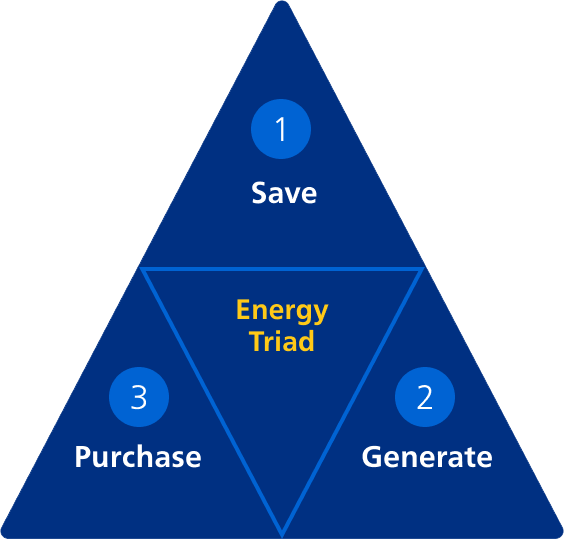Zero-emission enterprise

NS aspires to be a zero-emission company by 2040. We will realise that ambition once we are able to use green energy at any moment without depending on energy from fossil sources - including at times when there is no wind or sunshine. To achieve that, we focus on what is known as the energy triad:
-
Save as much energy as possible
-
Use our own lands and buildings for the sustainable generation of electricity
-
Strive for fossil-free energy purchasing
The Netherlands has set itself the target to achieve a 55% reduction in greenhouse gas emissions by 2050, relative to 1990. This target has been laid down in the European Climate Pact. NS contributes to this target by providing climate-neutral rail transport services and operating on a fully zero-emission basis in the future. In addition to greenhouse gases, rail transport appears to be responsible for relatively large emissions of particulate matter. We are examining ways of reducing those.
Saving energy
In recent years, NS has taken a range of measures to become more energy efficient. To operate our trains as efficiently as possible (traction energy), our drivers and guards have access to various devices such as tablets and smartwatches. At the end of the timetable, they park the trains as efficiently as possible to avoid unnecessary energy consumption.
We also improved our energy efficiency in the facility services area in 2022. In that year we inspected all our approximately 450 buildings and stations and made calculations for potential sustainability measures to reduce energy consumption levels. We will use the outcomes in 2023 to select the most suitable measures for all our real estate. In anticipation of those decisions, in 2022 we installed LED lighting at several maintenance sites and insulated several of our stations. We also replaced a number of air conditioning and air treatment installations by more climate-friendly alternatives. Effective January 2023, NS only leases out office spaces with energy label C or higher (which is a legal requirement). In response to the call by the European Commission for a maximum effort to save energy, at the beginning of 2022 we decided to reduce the heating standard by two degrees, where possible. Likewise, during the summer months we have reduced our cooling standard relative to the outside temperature.
Sustainable generation of energy and ‘greening’ our real estate
NS uses its buildings and lands for the generation of sustainable energy. In 2022 we completed a pilot project for the construction of a solar carport at a P+R facility. Unfortunately, due to the level of demand on the electricity grid the carport cannot currently be built. We will however use the experience gained during this pilot in other existing and future projects. After a study in 2022, we also qualified several hectares of land as promising for combining the sustainable generation of solar energy and efforts to increase biodiversity.
Purchasing zero-emission energy
The electricity that NS uses every year to run its trains is covered by a contract with energy supplier Eneco for the term of the current franchise (until the end of 2024). This was seen as a forward-looking contract at the time, as the electricity concerned had to come from wind farms still to be built (‘additionality’).
As a back-up arrangement, when there is no wind we operate our trains using the energy mix available at that moment. This includes fossil sources of energy. In the longer term, NS wants to eliminate this fossil back-up. A joint study with Eneco has shown that technologies such as demand-side management, generation management and energy storage can contribute to our zero-emission ambition. This is why NS has now taken steps to further explore those technologies and conduct experiments with them. One example is our participation in research carried out by European sector association Europe's Rail into energy storage and smart energy management in trains and along the tracks.
We purchase as much green power for our buildings as we consume. From 2020 through 2022, the entire volume of gas we consumed was green gas purchased via so-called guarantees of origin. These are certificates to demonstrate that the energy concerned was generated in a renewable way. Last year, NS decided to stop using guarantees of origin to compensate for its gas consumption, from the effective date of its new supply contract (1 January 2023). These certificates have become scarce and expensive. Since demand for green gas exceeds the supply, there is no certainty that the guarantees of origin help to actually make our gas consumption more sustainable. Moreover, compensation using guarantees of origin for gas does not incentivise the market to install more green gas plants. We invest the money not spent on guarantees of origin in measures to accelerate projects that minimise or eliminate gas consumption in our real estate.